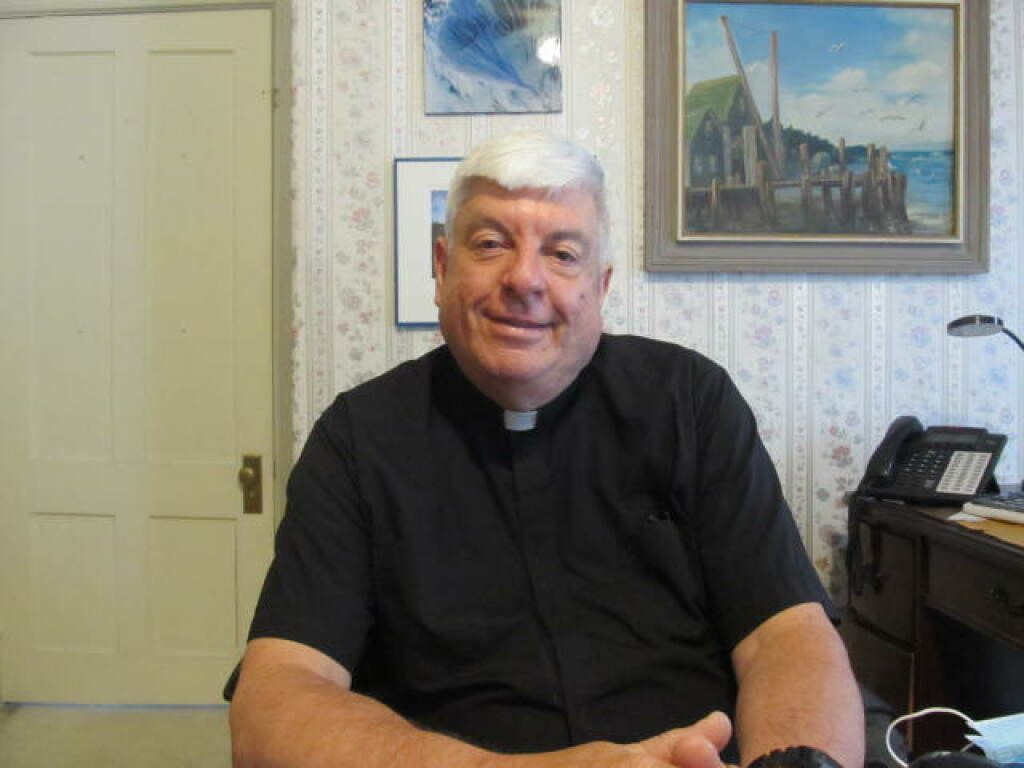
Praise of those who serve: the saints next door
Homily for Holy Thursday
April 1, 2021
A woman was asked by a teacher to tutor a boy who was in the hospital, so that he could keep up with his schoolwork. The woman agreed. When she got to the hospital, she discovered that the child was in the burn unit. She tried to tutor him the best she could, stumbling through an English lesson, ashamed at putting him through such a senseless exercise.
The next day, when she returned to the hospital, a nurse asked her, “What did you do to that boy?” Before the woman could apologize for the mess she had made, the nurse interrupted her: “You don’t understand. His entire attitude has changed. It’s as though he’s decided to live!”
When the boy was asked what had changed, he explained that he had completely given up hope until this young woman had arrived. With joyful tears, he explained, “They wouldn’t send a tutor to work on nouns and verbs with a dying boy, would they?”
Sometimes, we are invited into people’s lives and into places and events that, on the surface, have no meaning or purpose to us. We ask ourselves, what are we doing here? What purpose do we have here? Often we define our lives by what we can see or understand. We forget that we are part of something larger than ourselves.
Something like that happens to the disciples in today’s gospel reading—and especially to Peter. Peter was a man of traditional values. He knew his place. He was the student, and Jesus was the rabbi. Peter’s place was to listen—and if he could do some small service for his master, he would do it, out of respect and deference.
Then he looks down and sees Jesus kneeling in front of him, probably with his hand outstretched, wanting to wash Peter’s feet. Peter reacts according to the way he sees the world, according to what is “normal”.
Now, to understand this more fully, let me ask you: What do you think of when you see a pitcher, a basin and a towel? Maybe you’ve used a basin and a towel in your home. A child who is sick has thrown up, and you have to clean up the mess. A dog has made a mess on the floor, and you have to take care of it. Or maybe you’ve been in a hospital in a condition of weakness and illness, and a nurse comes with a basin and a towel to wash you—something you’ve been doing perfectly well for yourself all your life. A basin and a towel are humbling—are they not? That’s the situation Peter finds himself in, on a grand scale. Jesus, the eternal Son of God and about to be Savior of the world, wants to wash Peter’s feet. It’s embarrassing, and unnecessary, and unseemly, and Peter wants none of it. I think we can understand Peter’s discomfort. The same sort of thing happened when Pope Francis first became Pope. Instead of washing the symbolic feet of twelve priests, which had been the custom, he went to a youth detention center, and he started washing real feet of young incarcerated people, males and females, Muslims as well as Christians…and it caused quite a stir.
During the past year, we have (in a sense) had our feet washed in a way we never did before. I’m thinking of so-called “essential workers” who were forced to work, exposing themselves to a virus that we didn’t know much about. I’m talking about doctors, nurses, other healthcare workers, first responders, supermarket cashiers, those at the wheel of a garbage truck, mail delivery people, meat packers, vegetable pickers and bus drivers. While many of us stayed safely at home, they served us in a way that enabled us to survive. They are the unsung heroes, the “saints next door,” as Pope Francis called them, who gave tremendous service and washed our feet, serving our needs.
The fact that Jesus does it is a game changer of epic proportions. It reverses the normal way we look at things and invites us to turn our usual thinking about what is important upside down. Jesus came to serve, not to be served. And he invites us to get down from the high horse of privilege and supremacy of any kind, and to imitate him. Even those closest to him, including Peter, had a hard time understanding or dealing with this.
Perhaps when Jesus was nailed to a cross, showing that there is no greater love than to lay down one’s life for a friend, Peter began to understand. The Roman centurion understood. He knew what it was like to, in effect, lie down on a grenade, giving one’s life to save one’s comrades, one’s buddies, one’s loved ones. Mary and the other women who stood at the foot of the cross most likely understood because they knew what it was to serve, not just out of necessity, but of love.
The advice columnist Ann Landers was once asked, “What question are you asked most often?” She responded, “People ask: Why am I so lonely, so depressed?” And what advice does she give? To get involved. To find someone who needs help, perhaps someone who is worse off than you are, and help that person. And you know what? It works. People who are intent on loving and serving others tend to forget their own problems, or at least, see them in a wider context. Serving others, offering humble love, can bring healing.
It is interesting to note that on this Holy Thursday, when we remember the institution of the Eucharist, that we do not have a gospel reading from one of the other evangelists, who describe the beginnings of the Eucharist at the Last Supper. Instead, we have John’s gospel about the washing of feet. The two types of accounts actually fit together quite well. In the Eucharist we remember and re-create the profound act of Jesus’ great love and service: the Bread that is broken is the flesh that is pierced, lacerated and broken on the cross. The Chalice, which holds the pooled Blood of Christ, recalls the blood that was pooled at the foot of the cross. We are called to, and asked to share in, this great act of love: the sacrificing of self, the forgetting of self, so that we can serve others in love. Jesus led the way and showed us how, and he invites us to do the same.
Normally, on Holy Thursday we have the washing of feet to recall what Jesus did. But this year because of covid-19 restrictions, we can’t do that. But that ritual is actually a symbol of the real washing of feet, when we act like Jesus by serving others in love, surprising others because, like Jesus, we are willing to turn the world upside down and to serve rather than selfishly making ourselves the center of attention.
You might also like
Father's Homilies




